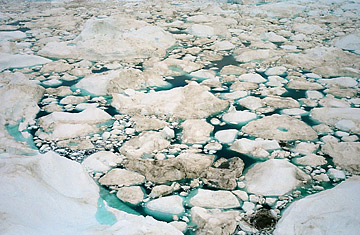
An aerial view of icebergs float in the Jacobshavn Fjord, near the town of Ilulissat, Greenland.
Something's not quite right with the climate. Over the past few years, while global CO2 emissions have continued to swell, the global temperature rise has leveled off. (Temperatures have not cooled, however; the National Oceanic and Atmospheric Administration just announced that last month was the warmest March on record.) Meanwhile, satellites and other observational tools indicate that the net heat retained by the planet has continued to increase, and that excess energy should be pushing up surface temperatures. But it's not.
In fact, up to half the heat energy that was expected to fuel global warming since 2003 has gone "missing." In a new article in the April 15 issue of Science, Kevin Trenberth and John Fasullo of the National Center for Atmospheric Research (NCAR) ponder where that heat may have gone — and what it could mean for the future of the climate. "We wanted to put together a narrative that deals with the recent leveling off of temperature," says Fasullo. "We wanted to go beyond temperature and explain the energy leaving the system and entering the system, the change of the flow of energy."
First, Trenberth and Fasullo looked at how heat energy works within the system of the earth. When sunlight reaches the planet's surface, it bounces back into space, but some of the heat energy is retained by greenhouse gases in the atmosphere — which is why we don't live on a cold, dead rock. But as we've raised the concentration of atmospheric greenhouse gases by burning more fossil fuels and forests, the planet has retained more heat from the sun. Over the past 50 years, about 90% of that extra energy has been absorbed by the oceans — slowly heating them — and the rest has gone into melting sea and land ice and heating the earth's surface and atmosphere. In other words, creating global warming.
Up to 2003, scientists have managed to track where heat energy flows within the planet's system and were able to effectively balance the earth's heat budget. Since then, however, satellite data has shown that CO2 concentrations in the atmosphere have continued to increase, which means that even more heat should be accumulating on the planet. Yet surface land temperatures haven't followed as expected; neither has the ocean's surface temperature, as measurements from thousands of Argo sensors floating on the sea indicate.
At the same time, there are other signs that climate change is continuing as expected. Since 1992, sea levels have continued to rise at a generally steady 3.2 mm per year, even over the past few years when temperature increases slowed. Glaciers and Arctic sea ice are still melting as well, indicating that heat is impacting the planet, even if it's not showing up on the thermometer. What's going on?
One possibility is that some of our measurements could be off. Although scientists have a lot of confidence in their ability to measure CO2 buildup and the energy balance in the atmosphere — the data used in the measurements comes from multiples sources, all of which, Fasullo says, "tell the same story" — our data on ocean temperatures isn't as good. The Argo sensors, deployed in 2000, are each 300 km apart and take readings only once every 10 days. It's possible there could be temperature changes over the vast expanses of the ocean that the Argo sensors are unable to detect. "Keeping track of temperature over the whole oceans isn't that easy," says Fasullo.
So, a likely scenario is that the missing heat is being sequestered deep in the ocean, well below the 900 m to 1,500 m range of our surface sensors. But despite their vastness, the deep oceans have a limit, says Fasullo, who thinks they won't behave as a heat sink over the long term. "That's not what we've seen over long time scales in the past," he says. "We clearly know the ocean can't absorb the heat indefinitely."
What scientists need are better research tools to get a more complete picture of the planet's energy budget, especially in marine systems. Oceans have never gotten the attention they deserve, despite the crucial role they play in the world's climate. Sensors that could detect temperature changes in the low depths would help, as would tools that could take measurements more frequently and over a wider expanse of the ocean.
Overall, the missing heat doesn't change expectations for future climate change, because the heat won't stay missing forever. Eventually it will resurface and impact the climate system, and the recent and deceptive reprieve from rapid warming we've enjoyed will come to an expected end. When that will happen is unknown, but better science can give us a clearer idea. "At the end of the day, the system will come back to equilibrium, and that suggests temperature will end up increasing," says Fasullo. So it's still up to us to do something about it.
